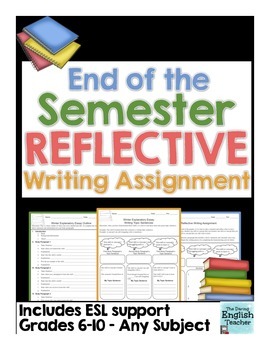

- #End of semester reflection examples how to
- #End of semester reflection examples update
- #End of semester reflection examples series
You can use a mind map to outline your thought process, ideas, and supporting arguments. You may also reference personal experiences that contradict the argument of the material. You can also review and reference other materials that support your position. Typically, you ask key questions after studying the text and write out problem areas you may notice in the document. You can disagree with the arguments made in the text and show the reasoning behind your judgment. Your reflection paper may contain your opinion of the academic material. Typically, you analyze the thesis, argument, or content of the text before writing your reflection paper.

Related: Important Skills Every Good Writer Must Possess 2. You can also write an outline of your ideas and supporting arguments. Your summary is not an exact copy of the material, and it can include a brief statement of your opinion on the work. If it's a fictional book, you can summarize the plot. If the text is nonfiction, your summary can comprise the author's thesis statement and reasoning. You can summarize the text or event in one or more paragraphs to guide your writing. Some reflection papers may require you to review a particular event. You can review similar texts and authorities to help you understand the content of the text. It's important that you review the material before writing the reflection paper. A good reflection paper maintains a formal tone while expressing your opinion on a particular subject.
#End of semester reflection examples how to
How to write a reflection paper in 8 stepsīy following these eight steps on how to write a reflection paper, you can properly analyze an experience or assigned text. In this article, we discuss how to write a reflection paper, discover what a reflection paper is, outline the types of reflection papers, provide tips on writing these documents, and answer frequently asked questions about reflection papers. You can write a good reflection paper by learning the format and structure that it requires. These papers provide an opportunity for students to analyze and review reading texts or experiences. One suggestion – if you do a mid-semester course evaluation, make sure students know what you heard them say and what, if anything, you will be doing differently as a result of their feedback.University students, high school graduates, and college professors typically write reflection papers. Here are examples of questions one could ask of students that include self and course mid-semester evaluation (Word document).

You might also want them to give you some feedback on how the course is going at the same time. You might want to give them specific questions to guide their reflection and writing – consider your goals and what you want them to get better at doing. It is likely that they don’t know how to do them well.

Mid-Semester Self-Evaluations – All students who entered this academic year (first years and transfers) must do self evaluations. Here is an example from Kristen Luschen that includes a portfolio checklist and directions for student’s course retrospective and self evaluation. If you do not use the course moodle site for your assignments, students need to know what will constitute their final course portfolios. This is a third Tips for Self-Evaluation (.doc) compiled across faculty, including Michele Hardesty.Here is Lynn Miller’s handout: Lynn on Self Evaluations (.pdf).
#End of semester reflection examples update
#End of semester reflection examples series
Here are a series of handouts that show different ways to engage in self evaluation. Here is the presentation on Critical Reflection and Evaluation (pdf) from the April 7th Faculty Meeting’s discussion on self reflection. To learn more about what students say about self evaluation, watch this video on data from the Hampshire Learning Project. In particular, you might want students to write about their learning relative to your course goals and/or their own. You can give students guidance about writing self evaluations. Some do not understand their purposes of self evaluation or how to write a meaningful self-evaluation. Many students make excellent use of self-evaluations. NEW!!! Guide to Self and Narrative Evaluation for Students (.pdf) – on writing self evaluations, using narrative evaluations from faculty, and setting goals for their work.īelow are older posts – much of which is folded into the new guide above, some might not be.


 0 kommentar(er)
0 kommentar(er)
